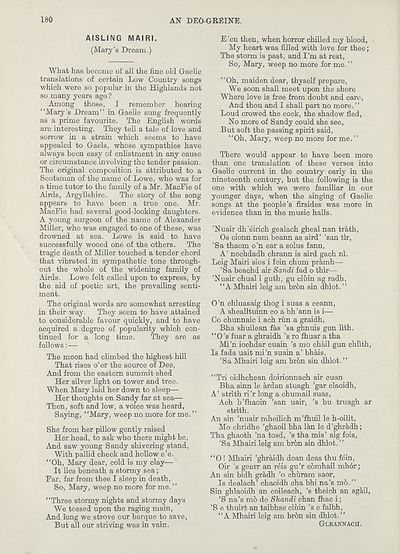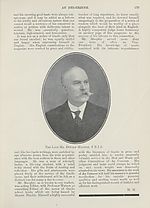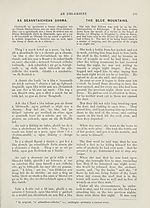An Comunn Gàidhealach Publications > Deo-gréine > Volume 17, October 1921 to September 1922
(188) Page 180
Download files
Complete book:
Individual page:
Thumbnail gallery: Grid view | List view

180
AN DEO-GKEINE.
AISLING MAIRI.
(Mary’s Dream.)
What has become of all the fine old Gaelic
translations of certain Low Country songs
which were so popular in the Highlands not
so many years ago ?
Among those, I remember hearing
“Mary’s Dream’’ in Gaelic sung frequently
as a prime favourite. The English words
are interesting. They tell a tale of love and
sorrow in a strain which seems to have
appealed to Gaels, whose sympathies have
always been easy of enhstment in any cause
or circumstance involving the tender passion.
The original composition is attributed to a
Scotsman of the name of Lowe, who was for
a time tutor to the family of a Mr. MacFie of
Airds, Argyllshire. The story of the song
appears to have been a true one. Mr.
MacFie had several good-looking daughters.
A young surgeon of the name of Alexander
Miller, who was engaged to one of these, was
drowned at sea. Lowe is said to have
successfully wooed one of the others. The
tragic death of Miller touched a tender chord
that vibrated in sympathetic tone through¬
out the whole of the widening family of
Airds. Lowe felt called upon to express, by
the aid of poetic art, the prevailing senti¬
ment.
The original words are somewhat arresting
in their way. They seem to have attained
to considerable favour quickly, and to have
acquired a degree of popularity which con¬
tinued for a long time. They are as
follows: —
The moon had climbed the highest hill
That rises o'er the source of Dee,
And from the eastern summit shed
Her silver light on tower and tree.
When Mary laid her down to sleep—
Her thoughts on Sandy far at sea—
Then, soft and low, a voice was heard,
Saying, “Mary, weep no more for me. ’’
She from her pillow gently raised
Her head, to ask who there might be,
And saw young Sandy shivering stand,
With pallid cheek and hollow e’e.
“Oh, Mary dear, cold is my clay—
It lies beneath a stormy sea;
Far, far from thee I sleep in death,
So, Mary, weep no more for me. ’’
“Three stormy nights and stormy days
We tossed upon the raging main,
And long we strove our barque to save,
But all our striving was in vain.
E’en then, when horror chilled my blood,
My heart was filled with love for thee;
The storm is past, and I’m at rest,
So, Mary, weep no more for me.”
“Oh, maiden dear, thyself prepare,
We soon shall meet upon the shore
Where love is free from doubt and care,
And thou and I shall part no more. ”
Loud crowed the cock, the shadow fled,
No more of Sandy could she see,
But soft the passing spirit said,
“Oh, Mary, weep no more for me.”
There would appear to have been more
than one translation of these verses into
Gaelic current in the country early in the
nineteenth century, but the following is the
one with which we were familiar in our
younger days, when the singing of Gaelic
songs at the people’s firsides was more in
evidence than in the music halls.
’Nuair dh’eirich gealach gheal nan trath,
Os cionn nam beann as aird’ ’san tlr,
’Sa thaom o’n ear a solus fann,
A’ nochdadh chrann is aird gach ni.
Leig Mairi sios i fein chum prkmh—
’Sa beachd air Sandi fad o thlr—
’Nuair chual i guth, gu ciiiin ag radh,
“A Mhairi leig am bron sin dhlot.”
O’n chluasaig thog i suas a ceann,
A shealltuinn co a bh’ann is i—
Co chunnaic i ach rim a graidh,
Bha shuilean f&s ’sa ghnuis gun 11th.
“O’s fuar a ghraidh’s ro fhuar a tha
Mi’n iochdar cuain ’s mo chkil gun chllth,
Is fada uait mi’n suain a’ bhkis,
’Sa Mhairi leig am br6n sin dhiot.”
“Tri oidhchean doirionnach air cuan
Bha sinn le krdan stuagh ’gar claoidh,
A’ strith ri’r long a chumail suas,
Ach b’fhaoin ’san uair, ’s bu truagh ar
strith.
An sin ’nuair mheilich m’fhuil le h-oillt,
Mo chridhe ’ghaoil bha Ikn le d’ghrkdh;
Tha ghaoth ’na tosd, ’s tha mis’ aig fois,
’Sa Mhairi leig am br6n sin dhlot. ”
“O ! Mhairi ’ghrkidh dean deas thu fein,
Oir’s gearr an reis gu’r cbmhail mh6r;
An sin bidh grkdh ’o chiiram saor,
Is dealach’ chaoidh cha bhi na’s m6. ”
Sin ghlaoidh an coileach, ’s theich an sgkil,
’S na’s mb de Shandi chan fhac i;
’S e thuirt an taibhse ciiiin’s e falbh,
“A Mhairi leig am brbn sin dhlot. ”
Gleannach.
AN DEO-GKEINE.
AISLING MAIRI.
(Mary’s Dream.)
What has become of all the fine old Gaelic
translations of certain Low Country songs
which were so popular in the Highlands not
so many years ago ?
Among those, I remember hearing
“Mary’s Dream’’ in Gaelic sung frequently
as a prime favourite. The English words
are interesting. They tell a tale of love and
sorrow in a strain which seems to have
appealed to Gaels, whose sympathies have
always been easy of enhstment in any cause
or circumstance involving the tender passion.
The original composition is attributed to a
Scotsman of the name of Lowe, who was for
a time tutor to the family of a Mr. MacFie of
Airds, Argyllshire. The story of the song
appears to have been a true one. Mr.
MacFie had several good-looking daughters.
A young surgeon of the name of Alexander
Miller, who was engaged to one of these, was
drowned at sea. Lowe is said to have
successfully wooed one of the others. The
tragic death of Miller touched a tender chord
that vibrated in sympathetic tone through¬
out the whole of the widening family of
Airds. Lowe felt called upon to express, by
the aid of poetic art, the prevailing senti¬
ment.
The original words are somewhat arresting
in their way. They seem to have attained
to considerable favour quickly, and to have
acquired a degree of popularity which con¬
tinued for a long time. They are as
follows: —
The moon had climbed the highest hill
That rises o'er the source of Dee,
And from the eastern summit shed
Her silver light on tower and tree.
When Mary laid her down to sleep—
Her thoughts on Sandy far at sea—
Then, soft and low, a voice was heard,
Saying, “Mary, weep no more for me. ’’
She from her pillow gently raised
Her head, to ask who there might be,
And saw young Sandy shivering stand,
With pallid cheek and hollow e’e.
“Oh, Mary dear, cold is my clay—
It lies beneath a stormy sea;
Far, far from thee I sleep in death,
So, Mary, weep no more for me. ’’
“Three stormy nights and stormy days
We tossed upon the raging main,
And long we strove our barque to save,
But all our striving was in vain.
E’en then, when horror chilled my blood,
My heart was filled with love for thee;
The storm is past, and I’m at rest,
So, Mary, weep no more for me.”
“Oh, maiden dear, thyself prepare,
We soon shall meet upon the shore
Where love is free from doubt and care,
And thou and I shall part no more. ”
Loud crowed the cock, the shadow fled,
No more of Sandy could she see,
But soft the passing spirit said,
“Oh, Mary, weep no more for me.”
There would appear to have been more
than one translation of these verses into
Gaelic current in the country early in the
nineteenth century, but the following is the
one with which we were familiar in our
younger days, when the singing of Gaelic
songs at the people’s firsides was more in
evidence than in the music halls.
’Nuair dh’eirich gealach gheal nan trath,
Os cionn nam beann as aird’ ’san tlr,
’Sa thaom o’n ear a solus fann,
A’ nochdadh chrann is aird gach ni.
Leig Mairi sios i fein chum prkmh—
’Sa beachd air Sandi fad o thlr—
’Nuair chual i guth, gu ciiiin ag radh,
“A Mhairi leig am bron sin dhlot.”
O’n chluasaig thog i suas a ceann,
A shealltuinn co a bh’ann is i—
Co chunnaic i ach rim a graidh,
Bha shuilean f&s ’sa ghnuis gun 11th.
“O’s fuar a ghraidh’s ro fhuar a tha
Mi’n iochdar cuain ’s mo chkil gun chllth,
Is fada uait mi’n suain a’ bhkis,
’Sa Mhairi leig am br6n sin dhiot.”
“Tri oidhchean doirionnach air cuan
Bha sinn le krdan stuagh ’gar claoidh,
A’ strith ri’r long a chumail suas,
Ach b’fhaoin ’san uair, ’s bu truagh ar
strith.
An sin ’nuair mheilich m’fhuil le h-oillt,
Mo chridhe ’ghaoil bha Ikn le d’ghrkdh;
Tha ghaoth ’na tosd, ’s tha mis’ aig fois,
’Sa Mhairi leig am br6n sin dhlot. ”
“O ! Mhairi ’ghrkidh dean deas thu fein,
Oir’s gearr an reis gu’r cbmhail mh6r;
An sin bidh grkdh ’o chiiram saor,
Is dealach’ chaoidh cha bhi na’s m6. ”
Sin ghlaoidh an coileach, ’s theich an sgkil,
’S na’s mb de Shandi chan fhac i;
’S e thuirt an taibhse ciiiin’s e falbh,
“A Mhairi leig am brbn sin dhlot. ”
Gleannach.
Set display mode to:
![]() Universal Viewer |
Universal Viewer | ![]() Mirador |
Large image | Transcription
Mirador |
Large image | Transcription
| An Comunn Gàidhealach > An Comunn Gàidhealach Publications > Deo-gréine > Volume 17, October 1921 to September 1922 > (188) Page 180 |
|---|
| Permanent URL | https://digital.nls.uk/127172229 |
|---|
| Description | Leabhar 17, Treasamh Mios an Fhoghair 1921 gu Dara Mìos an Fhoghair 1922 |
|---|---|
| Attribution and copyright: |
|
| Description | This contains items published by An Comunn, which are not specifically Mòd-related. It includes journals, annual reports and corporate documents, policy statements, educational resources and published plays and literature. It is arranged alphabetically by title. |
|---|
| Description | A collection of over 400 items published by An Comunn Gàidhealach, the organisation which promotes Gaelic language and culture and organises the Royal National Mòd. Dating from 1891 up to the present day, the collection includes journals and newspapers, annual reports, educational materials, national Mòd programmes, published Mòd literature and music. |
|---|---|
| Additional NLS resources: |
|

